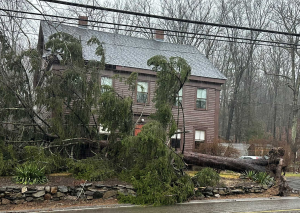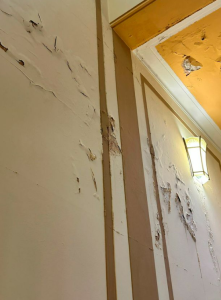
By Wang Hanling
By announcing that Japan would begin releasing nuclear-contaminated seawater from the Fukushima Daiichi Nuclear Power Plant as soon as Thursday, Japanese Prime Minister Fumio Kishida has shown that he and his administration do not give a damn about marine ecology or human health.
Kishida’s announcement came two days after his Camp David meeting in Maryland with Presidents of the United States and the Republic of Korea. It is also surprising that the US, or ROK as Japan’s neighbour, could be affected by radioactive water.
The International Atomic Energy Agency (IAEA) has committed that it will continue to supervise and evaluate the activities at the site, to make sure that they are in compliance with safety standards. This includes the day before the discharge begins and the following days.
A major question arises, however: if the IAEA is unable to help Japan if the nuclear process begins and causes harm to the marine ecosystem, can it assist Japan to rectify the situation?
Kishida does a great disservice to the Earth and the Seas by assuming the IAEA review of Japan’s plan to release radioactive water in the oceans gives the country the right to do so.
IAEA review report issued July 4 includes the following key points: Japan’s release of so-called radioactive water treated with radiation is in accordance with IAEA safety standards and its effect on marine ecology, human health and the environment would be minimal.
IAEA review and assessment were based solely on data and information supplied by Japan. This included only a small number of samples that Japan unilaterally chose. Problem is, the validity of the data is in question. The IAEA admits in its report that Japan’s Advanced Liquid Processing System (which it has marketed as a “magic pill”) cannot remove tritium and other radioactive elements from radioactive water.
The ALPS method has been shown to be ineffective at removing radioactive elements such as carbon-14 and tritium, which can have a life expectancy of 5 730 years. These isotopes are capable of passing through the food-chain to reach other organisms or humans. The long-term effects are unknown of the radioactive waste that Japan plans to dump in the ocean over the next thirty years.
IAEA’s report cannot legitimize Japan’s plan to discharge radioactive water, as its conclusions contradict those of authoritative institutions like the German Institute for Marine Research or peer-reviewed research published in US magazine Science. The IAEA is not authorized to approve Japan’s plan for water discharge.
IAEA’s goal is to increase the use of atomic power to promote peace, health and prosperity around the globe. According to Article 3.A.6 in the IAEA Statute, the agency has the authority to “establish or adopt standards for safety to protect health, minimize dangers to life, and property, where necessary, with consultation with competent organs and specialized agencies of the United Nations, and when appropriate in collaboration.”
In all actuality, the IAEA’s report is not an approval for Japan’s plan to discharge water or a legal authorization of its discharge. Rafael Mariano Grossi is the director general of IAEA. He stated that “the Government of Japan has the sole authority to decide whether or not the water treated at Fukushima Power Station will be released into the sea”.
Japan Must Compensate for Marine Damage
States should bear responsibility and liability for transboundary nuclear contamination and damage resulting from it, as decisions relating to nuclear safety fall under national jurisdiction. Since the Japanese government decided to release the radioactive waters into the ocean, they must be held responsible and liable for any transboundary nuclear pollution as well as the damages caused.
According to Article 192 of the United Nations Convention on the Law of the Sea to which Japan belongs, states are obliged to protect and conserve the marine environment. Article 194 states that they should use the best means available to them to reduce, prevent and control any pollution to the marine environment.
The states should take the necessary measures to make sure that any activities that fall under their control or jurisdiction do not pollute other countries or their environments, or spread pollution beyond their sovereign jurisdiction.
The measures taken must also address all the sources of marine pollution and minimise the amount of harmful, toxic or noxious materials released into the ocean. Japan is responsible for any violations of these obligations, as well as of a number treaties relating to marine environment protection and nuclear safety.
Japan is responsible for any damage that may be caused to the environment by the release of radioactive water in the ocean, regardless of whether it’s based on international conventions, treaties, or customary international law. This includes the principle “polluter pays” and the compensation of transboundary damages.
Japan’s legal system for compensation for nuclear damages is relatively complex. It includes four main legislative instruments, namely the Act on Compensation for Nuclear Damage Act, the Order for the Execution of the Act on Compensation for Nuclear Damage Act, the Act on Indemnity Agreement for Compensation of Nuclear Damage Act, and the Order for the Execution of the Act on Indemnity Agreement for Compensation of Nuclear Damage Act. Japanese law incorporates a variety of third party liability principles.
According to the Act on Compensation for Nuclear Damage, “nuclear damages” are defined as “any damage that is caused by nuclear fission, radiation, nuclear fuel or the toxic properties of these materials”. Nuclear plant operators, including TEPCO in Japan are responsible for any nuclear damage that is caused by natural disasters like an earthquake or volcanic eruption.
Under Japanese law, nuclear plant operators are liable for any and all losses, however, they may be able to cover them through an indemnity contract with the Japanese Government. Environmental refugees and those who have suffered nuclear contamination damage from the Fukushima Daiichi Nuclear Power Plant damaged filed a number of lawsuits in Japan for large amounts of compensation.
International law holds Japan responsible for any damage caused by the release of radioactive water in the ocean. Accordingly, states along the coast, such as China and the Democratic People’s Republic of Korea and the Republic of Korea can file suit against Japan before the International Court of Justice or the International Tribunal for the Law of the Sea.
It is important to restore water damage in order to minimize the damaging effects that can occur from water incidents. Water damage, whether caused by plumbing problems, leaks or floods can cause structural degradation, mold and devaluation of your property. If you have liked and served what we can offer you, you can go here to find out more https://ncrestoration.ca/. Water damage professionals have the equipment and expertise to quickly address the issue. Commercial water damage restoration services, dehumidification, and drying are all done efficiently to avoid further mold growth and damage. You can protect your home, maintain its value and create a healthy and safe living space by contacting a professional water damage restoration company.





